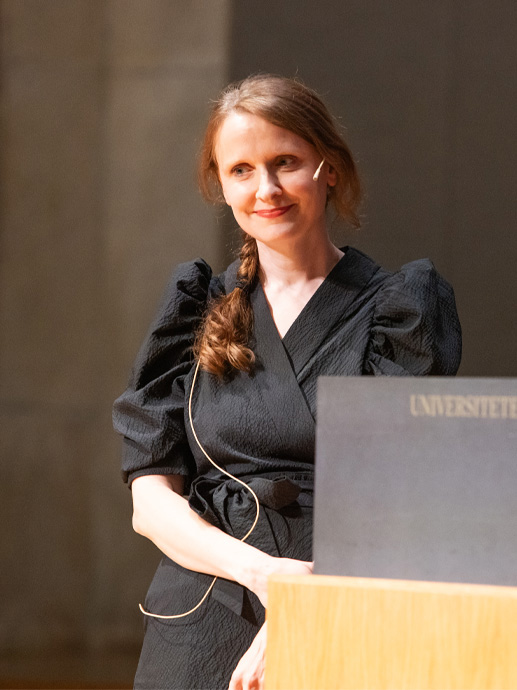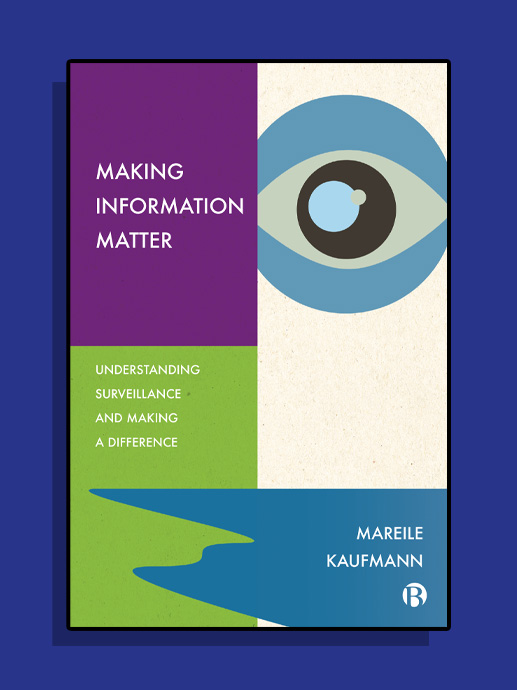The Norwegian Broadcasting Corporation (NRK) recently published a feature on prominent physicists and mathematicians who discuss the likelihood of us all living in a computer game. That our reality, our consciousness, and lives can be understood as digital simulations, and we are characters in a someone’s game. That our material reality is in fact a series of coded numbers.
A glitch in the matrix
Many will associate this idea with the popular Hollywood movie The Matrix, where the lead character Neo is given the option of taking a red pill that would enable him to understand what occurs outside the illusion created by the Matrix, or a blue pill, which would allow him to return to experiencing only that illusion. This is a philosophical discussion that did not begin with the advent of computers and AI but can be traced back to Plato and other philosophers.
Mareile Kaufmann is a professor specializing in digital criminology and she has recently published the book Making Information Matter, which advances a new view of information and surveillance practices, as well as their related agencies, politics and powers.
– So, are we simulations living in a computer game?
– Maybe I’m just a simulation, laughs Kaufmann. At least I can say for sure what I am not: a particle physicist or information scientist. I am part of a research tradition that is interested in science from a sociological perspective. The natural sciences are crucial to understand the relationship between technology and our lives. But sociologists, too, have something to contribute to this debate.
According to Kaufmann, not only have ongoing discussions about AI, large language models and simulation hypotheses become complex. They also feature a mix of philosophical positions about the relationship between humans, technologies, and information.
– Though these positions may not be obvious at first, they make existential claims. This is why it is important to disentangle and understand these positions. When we discuss our assumptions about the why and how of this planet it is worth asking: where is our place in this – as humans in societies where information matters?

We are the actors and can manipulate information. Or can we?
Much of the media coverage about AI &Co draws on the natural sciences. The basis of many scientific discourses is to run experiments and test hypotheses.
– But we should not forget, states Kaufmann, that the idea of validating or invalidating a hypothesis through experimentation has its own philosophical base. It is Descartes’ "Cogito ergo sum". I think, therefore I am. Our mind is split from our body. Our mind can master the body. We can master other bodies and things by making experiments. We can reproduce information and expect to arrive at the same results, or at least reliable results. Things are passive and we can manipulate them. We are the actors.
According to Kaufmann, recently, Plato’s shadows on the cave’s wall became more central to the discussion on technology and information. Oblivious of the "real world" the prisoners in the cave only see and relate to their shadows. His allegory, Kaufmann explains, is drawn into debates about simulation theories. Everything is data and since our senses don’t have access to the underlying configuration of the world, we live – practically and ontologically speaking – in a simulation. What starts this simulation is unclear.
That brings us to the field of information studies.
– Then there are philosophies of information that suggest we are on our way to immateriality. Our lives used to be characterized by physical objects, but such objects are increasingly informationalised. Once they have become information, objects become clonable. The world moves away from being physical to being abstract. This is slightly different from theories that suggest that any physical experience is information per se.
Choosing the red or the blue pill
– In the film The Matrix the main character Neo gets the choice of whether he wants to know reality. He ended up choosing the truth – the red pill – and started a war against the machines. In your book Making Information Matter, you do not argue for a war on technology, but an ethical engagement with digitization. In a time with machine learning, AI and simulated realities – is the war already lost or did Neo make the wrong choice?
– Great question. My book ultimately calls for engagement in a world where information shapes societies and we shape information. Information matters, but we are also a part of making it matter. So when we become excited, seduced or worried by the idea of AI gaining consciousness or ourselves being ones and zeros it’s worth tracing the different philosophical positions that inform the debate. There is much more to say about each of the different philosophies. And the examples I mention are surely not exhausting ongoing discussions about information, technology, and our existence. But the three positions I mentioned earlier are useful to make a point. Why? Because each position makes quite fundamental claims about who we are and what our role in this is:
– Position one suggests that matter exists and that we master it, which would mean that we also master computers and information.
– Position two is not primarily interested in the question of materiality. It suggests that we are ones and zeros, a program run by something or someone else. This leaves little to no space for the existence of ourselves or things as we know them. Interestingly, studying the likelihood of being a simulation through experimentation would, at least according to position one, be impossible.
– Position three suggests that we live our lives with abstract information objects. Maybe us, too, are abstract at our base. Some argue that with increasing digitization, we will be consumed by the infosphere.

Mareile Kaufmann says she is intrigued by Karen Barad who is both a physicist, a feminist and a philosopher. She is known for her book Meeting the Universe Halfway: Quantum Physics and the Entanglement of Matter and Meaning. Barad suggests that we are always part of – and act together with – other matter. We are shaping each other and continue to materialize together. We continue to matter together. However, Barad’s theory still underlines that humans, too, have a part to play as responsible actors.
– What I like about her theory is that it takes humans away from the center, but still allows them to act. It is a humble position in that human ratio does not rule over other phenomena in this world.
Making information matter
– So where does that leave your work?
– In my work on science and information technologies I have "followed information around" by studying, for example, how profiling algorithms and prediction software are built, used and how they change societies. Through my empirical work I did not arrive at a natural scientific theory about information and technology, but a socio-technical one inspired by materialist positions.
She is particularly fascinated by digital data, because it is hard to get a grip of them in our everyday lives.
– To us, digital data seem abstract. We are a lot more charmed by the idea that algorithms begin to act and machines gain consciousness. Why, then, should we not think of data as material and lively? What I observed is that data cannot exist without infrastructures. They continue to materialize in different systems. In these different forms data also become lively when we interact with them. When I "followed digital data around" I did not come to think of it as detached information. It is always embedded in, for example, tubes, wires, computers, storage devices, metals. In the end, it’s matter. This something that materialist positions in physics also take as a vantage point to talk about our existence. Digital data are not floating in virtual spheres, something that we may associate with the term "cloud". Actually, researchers have shown that digital data re-shape Earth’s atmosphere, because 1–2% of the world’s CO2 emissions are the result of data centers and networked devices. That’s not abstract, but pretty concrete.

– The example shows the ways in which electronic data cannot exist without material infrastructures, such as data centers and the materials they combine. That data centers produce CO2 emissions also shows that we should not be seduced to think about matter as something passive. Apparently, us humans don’t seem to master the matter of data-pollution. But we are still in this together. Data take different shapes, but always ‘act’ together with humans. That was also the case in the information environments that I studied, from hacking to police work.
How to make information matter?
– What is then our space in information-heavy societies?
– I do not question the power of information, of ones and zeros, of machines or AI. Neither did I develop a theory that confirms, validates, or discredits insights from the natural sciences. I arrive at some of their base assumptions – but as a result of my sociological empirics.
– My book is an invitation: Let’s challenge each other to ask questions about the fundamental assumptions that sit in theories about information, technology and humans. In this debate, I suggest thinking of ourselves and information as material and as in a process of shaping each other. We matter. The powers of machines and datasets are not abstract and disconnected from the worlds we live in. We have a role to play in the ways in which information societies develop and we need to take that role seriously. We may not be able to master information, but we can co-shape, we can influence how we live with digital data today and in the future.
More about the book:
More about digital criminology:
Facts:
Mareile Kaufmann is currently heading two research projects at the intersection of biology, technology and law enforcement: An ERC-funded project on how big genome data changes forensic practices and computing, as well as a project on forensic, legal and cultural practices around death and dead bodies.
